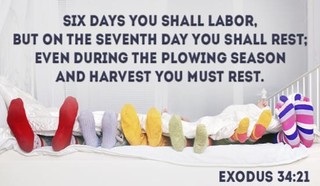
- Recent Translations
- All Translations
Exodus 34:21
Share
Settings
Images for Exodus 34:21

Exodus 34:21 in Other Translations
Exodus 34:21 Meaning and Commentary
Six days shalt thou work, but on the seventh day thou
shalt rest
This is the law of the seventh day sabbath, which is after repeated, to fix it in the minds and memories of the people, see ( Exodus 20:10 ) ( 23:12 ) ( 31:15 ) and here it is added, which has not been mentioned before:
in earing and in harvest thou shall rest;
that is, in the time of ploughing, and in the time of reaping and gathering in the harvest, which are both very busy seasons; the rest of the sabbath was not to be violated; such sort of works, though they might require haste and expedition, yet the sabbath was not to be broken on account of them: this is the common sense of the law, as it is understood; but Maimonides F15 gives another sense from their doctors, who say, it is forbidden to plough in the sixth year what cannot be reaped but in the seventh; and so likewise that it is forbidden to reap on the seventh year, that of which profit may be had on the eighth year, and this is founded on what the Scripture says, ( Exodus 34:21 ) "in earing" and they say, that here ploughing and harvest are not to be understood of the seventh day, because this is included in the general rule, "thou shalt not do any work"--they say, of that which is ploughed, whose reaping or harvest is forbidden, is the ploughing at the evening of the seventh year, and at the going out of the seventh; and know this, that the evening of the seventh is the sixth year, and the going out of the seventh is the eighth year, and so Jarchi on the text observes, that some of their Rabbins say, this is to be understood of the ploughing of the seventh year, the seventh year entering, and the harvest of the seventh year, at the going out of it; so that as there is a seventh day of rest, there is a year in which ploughing and harvest are forbidden; but there are others, he says, who say the text speaks only of the sabbath.
F15 In Misn. Sheviith, c. 14. sect. 1.